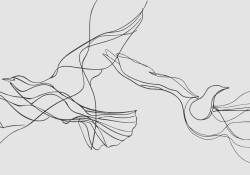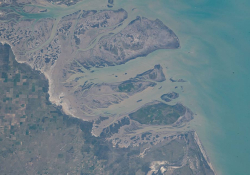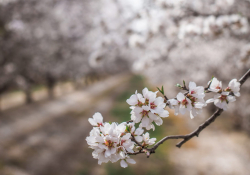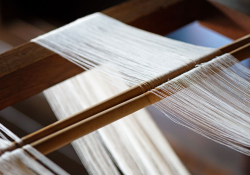Dylana and Diram (an excerpt)
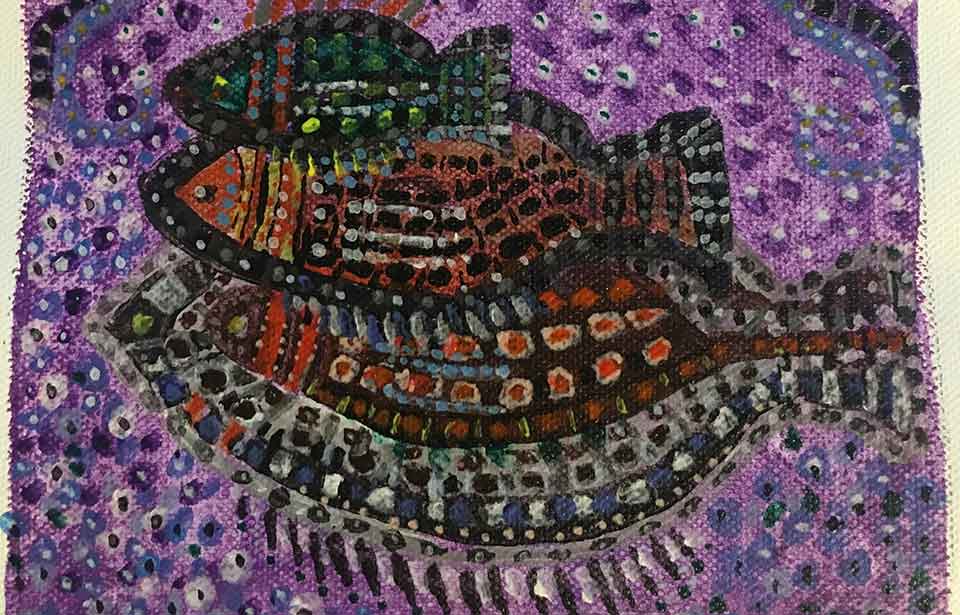
Translator’s note: Salim Barakat’s language is intimidatingly dense and complex, flaunting a vast and daunting vocabulary. His texts possess an “organic” music and a formal orientation that are the products of an aggressive and intimate excavation of the Arabic language’s creative and thinking powers. Barakat’s work in poetry and in prose posits a distinct redefining of the poetic, rooted in a confrontation with the Arabic language and close examination of the meaning of its grammar and syntax.
In this long narrative poem Barakat retells a Kurdish folktale based on the true-love story of a country youth, Diram, and a mature married woman, Dylana. The “poetic” is achieved here by deliberately disrupting, delaying, and challenging the narrative and its modes. Dylana and Diram is a “poem of amplitude,” as T. S. Eliot puts it, a poem that could only have been written by a poet who is also a “master of the prosaic.” It is excessive and digressive in all its elements. The love story is not set against or in the landscape, but rather Dylana and Diram’s love infiltrates and overwhelms the landscape. Barakat does not use images of nature to draw analogies with their relationship. The spiritual and sensual bond between them consumes nature and natural scenery and transforms it into a mere manifestation of a surging emotional deluge. – Huda Fakhreddine
* * *
A mountain goat on a hill
and a stillness that raises its horns high as a mountain goat.
Don’t move a step closer, O guide!
Don’t move a step further.
Your place is the place from which roots eye roots
and the earth eyes its inheritance.
A mountain goat on a hill
and a stubborn stillness raising its horns high as the goat.
1.
Look at her, a heap of blond baskets under the flashing of your blood, Diram. Look how she sleeps upon your arm, her breaths falling star after star in the vastness of your virility. . . . Do you remember, Diram, the time you came to her, timid, wrapped in fields, your steps the steps of day, and your clamor the clamor of wheat stalks? Do you remember the evening that glittered in your eyes, that first evening when you both plundered with kisses the treasures of being and uncovered a strange stream under the bedrock of the soul? Easy, Diram! Let it be slow, your enchantment of the chambers of her heart – Dylana’s heart, which hangs like a beat, full of life.
2.
Look at him. A blond arrow under the flashing of your blood, Dylana. See how he decorates the evening with the rattle of his manhood. He climbs to you on a ladder of gasps, as if all luxury is his, as if you are the words by which he chants the song of man. Sing to him what the cloud sings to its daughter. Come down from your cloying sweetness and reveal the seduction of heights, so you may take the field of his heart with the wheat of your song? Come, Dylana, he is leaning closer, narrating fruit.
3.
Look at her, see how she graces your chest with a ray of lips and fingers. Look at her, Diram, and you shall see twenty hearts beneath her heart. Each heart hallucinates another twenty from its dream. She is the river’s mouth to every man anointed with the rumble of roots. She is the seeping of hours and arguments, the final drain of every bravery or fear. Don’t move a step closer, Diram! Don’t move a step further! Your place is the place from which sweetness spies itself asleep in blond baskets and blood.
4.
Rise, Dylana, and tighten your soft siege. You are the forest where his line shall flourish and the entrails mix with birds. You are his rattling amid rattling. You are his praise, in which every king sees his kingdom and every tramp a path to the throne. So when he leans over you, raise to him the vessel of woman and to his trembling chest raise the shield of your bosom, bloodied with clouds and with ages.
5.
Rise, Diram! Stand up to see from the peaks of mirth the slope of woman spread from glaring masks to song. You are the sword to her springs. With you she strikes the mornings and they split open into longings and elk. You are her breath among breaths and her praise in which air dips the stray arrows of gods. So when she leans over you, raise to her mouth your mouth, studded with the song of man, and to her trembling bosom raise the shield of your bosom, stippled with water and eulogies.
6.
Look at him, Dylana! See how he gathers thunderbolts and scatters winds over your bed. See how he dangles from your gasping like fruit. He lays traps for plants as if bragging of you to the penetrance of water. See how he surrounds water like land, so he may besiege your heartbeat rising, like foam and ships, from water. . . . When he opens his net at close of day, scattering planets and pike-fish, let him sleep in his prophecies. Let him be, Dylana. All he grasps of the earth is a handful of brick, and all he sees is the slope of your breast spreading over earth a shadow of evening and manhood.
7.
Look at her, Diram! See how she gathers flocks of geese before your heart and weaves the clouds. See how she sways toward you, herd by herd from the farthest slope, hand in hand with the gathering horizon. When she leaps streams, her dress reveals roots that do not touch the earth but graze the praises with which all roots cover themselves. If you decide to take her hand in yours, you take the horizon too. If you decide to hold her, then let the roots hold you; may fruit sip fruit from your breath; may the earth rush to you, unsheathing her flood of milk and forms.
8.
Wake him, Dylana! Wake him from a sleep embroidered with the sweetness of a thousand drunken hearts. Wake the morning with him so they may set out together toward you, dusted with lust, with opulence, with glee. For he is the last one you’ll see hallucinating, blowing into illusory horns, filling, like a servant, the cups of the drowned with heroism. There he stands, in his own gale, in the ancient gusting of roots and the rejoicing of the wild in the wild. He is the last one you will see approaching like the sign a storm sends before it wears bloody armor and yanks away the tablecloth, shattering plates against the soul’s marble. Wake him. Wake him up, Dylana.
9.
Wake her, Diram! Wake the butterfly of the unseen and its golden dragonfly. . . . Wake Dylana and, with her, wake the house, stone by stone, and then the square around the house and then the fence. And when done with that, wake the morning that sleeps by the fence. Say: Come, Dylana, come let us witness the hesitant shining of the earth as it sheds iron and splendor to our human shield. Come, let us bare our breasts to the fields, trembling with the sweetness of a spearhead sunk deep where the sesame and saffron flow. As if, together, we strive to be wounds beyond which are no wounds. Come, wake her up, Diram.
10.
Wake him, Dylana! Wake the boy, his naked chest restless under a pouring ray. Wake him, wake the day and the loaves. Fill your pail – that from which you water the unseen animals of morning – fill it with cocoons of silk and berries that fall from praise. Weave with silk and berries the sweetness draped over Diram. Wake him. Wake him up, Dylana.
11.
Wake her, Diram! Wake the dream from under her lashes. Throw a pebble of time into her, may she quiver like the face of a spring; may she widen ring by ring, each a carriage carrying herbs and pathways. Come, by god, the messenger of the valleys is picking bouquets of fog for you both and spreading lavender childhood over the fence by the house. Wake her. Wake her up, Diram.
12.
Wake him, Dylana! Wake the face of the charade, that boy encircled by the scythes of gods. Wake him so you may witness the hasty morning dew and its humorous seductions. May you know that the dew neighs in the grass and has horns that declare good-natured heresy in good-natured soil.
13.
Wake her, Diram! Wake the celestial pomp of Dylana. Scatter over her beads of morning and arrogance. If she spreads out before you, waking, study her the way a plant studies a plant. Sit together in the shade of kisses and let songs of songs seduce you. Wake her, Diram. Wake her up!
14.
Wake him, Dylana! Wake the human ray, Diram, as he drunkenly descends from the splendor of man. Don’t drape your hands or your gasping over him. Let him extend, clear and lucent; buds and bunches looming within him. You will then possess him and all that looms within him. You can choose to be the human home of plant and cloud and wings. Dylana, wake him up!
15.
Wake her, Diram! Wake the living blood and its friendly forms. Crown yourself for Dylana’s waking with gentle drumming. It is the waking of a throne by whose power the fountains rise and the streams run. She is your bow. With her you launch – when you launch – your self in a final song. Wake her, Diram, wake her up!
16.
Wake him, Dylana! Wake opulence and its friendly forms. Witness the opening of his eyelashes release birds. He is a wakefulness only morning knows, grasping the sound of water. He is your bow. With him you shoot – when you shoot – your entirety in a final song. Wake him, Dylana, wake him up!
17.
Wake her, Diram! Wake Dylana, an ocean of foam. Spread your sails when she twists under the sweep of your morning blood. Charge her blood with naked clouds. Wake her, Diram, wake her up!
Wake him up,
Wake her up,
I did not wish to wake the earth that morning.
The earth did not wish to wake me either.
Everything passes when the signs are complete, and he who grasps onto moaning will depart with morning. Thus, they set out – Dylana and Diram – and I did not wish to wake the earth that morning and it did not wish to wake me.
. . .
They were heading back and the earth too was heading back from its daily harvest of a thousand wheat stalks, a thousand blazes, a thousand intrusions where the brave have abandoned their destinies under an invisible wave, a thousand cracked shields, a thousand thunderbolts wet with kisses; a thousand men shot Dylana and Diram with arrows of ash; they bowed to the silence that scatters waters in its wake and ravages flowers.
Thus, they set out: a boy and a woman.
And I am a guide who led two lovers to naught but sweet futility. I knew when the heart inherits the river’s mouth, it reveals itself, like a secret the delirious sheds. But I took them with me nevertheless – swaddled in lightning bolts that bloom into bitter halos – I took them toward an uninherited splendor, and there I said: Spread your sails like a rising star with which land listens for the tapping of water on water’s shield.
. . .
By god, by god, do not ask me, after all this, do not ask me to narrate the earth, direction by direction, and the sky, bolt by bolt. I am the perpetuation of the story, and if I speak, I speak my heart scattering in the storm like copper sand grouses. No! Do not ask me, after all this, to narrate death with death, and to tread upon this sweetness like the void of a mule’s hoof. Look, as you sit there on a sunset fence, look and you will see twenty men covering Diram and Dylana with their cloaks. Then, a single line of blood trickles brazenly among pebbles and straw and disappears at the edge of desolation.
Translation from the Arabic
Editorial note: From al-Karākī (1981; Pike).
See an overview of the special section on Kurdish poetry from this issue.



